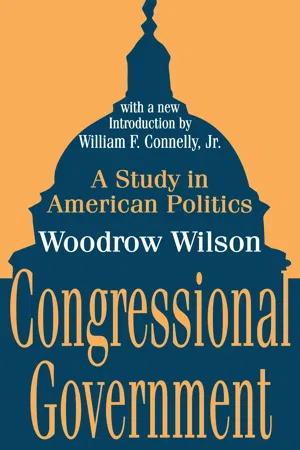
- 344 pages
- English
- ePUB (mobile friendly)
- Available on iOS & Android
About This Book
The government of the United States is a living system. As such, it is subject to subtle change and modification over time, but still maintains a constancy via its central nervous system-a congressional form of rule. Woodrow Wilson saw congressional government as ""Committee"" government. It is administered by semi-independent executive agents who obey the dictates of a legislature, though the agents themselves are not of ultimate authority or accountability. Written by Wilson when he was a twenty-eight-year-old graduate student, this is an astounding examination of the American legislative branches, especially in light of the fact that Wilson had not yet even visited Congress at the time of its composition.Wilson divides Congressional Government into six parts. In part one, his introductory statement, Wilson analyzes the need for a federal Constitution and asks whether or not it is still a document that should be unquestioningly venerated. In part two, Wilson describes the make-up and functions of the House of Representatives in painstaking detail. Part three is concerned with taxation and financial administration by the government and its resulting economic repercussions. Part four is an explanation of the Senate's role in the legislative process. The electoral system and responsibilities of the president are the central concerns of part five. And Wilson concludes, in part six, with a both philosophical and practical summarization of the congressional form of the United States government, in which he also compares it to European modes of state governance.In a new introduction specially prepared for this edition, William F. Connelly, Jr. compares Wilson, as a professional politician, to former Speaker of the House Newt Gingrich. He notes that Wilson's ideas, which have had a lasting influence, helped form Gingrich's outlook on the role of the Constitution and the executive branch in the legislative process. He also investigates Wilson's criticism of Madison's separat
Frequently asked questions
Information
Index
Table of contents
- Cover Page
- Title Page
- Copyright Page
- Dedication Page
- Contents
- Transaction Introduction
- Preface to Fifteenth Edition
- Preface
- I. Introductory
- II. The House of Representatives.
- III. The House of Representatives. Revenue and Supply.
- IV. The Senate.
- V. The Executive.
- VI. Conclusion.
- Index